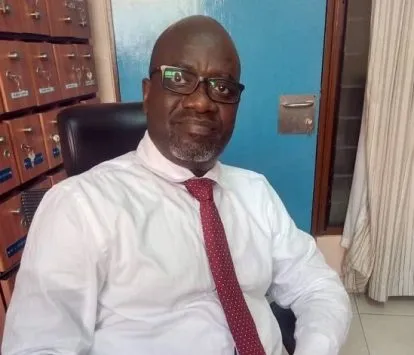Ghanaian Specialist Urges Men to Prioritize Breast Cancer Screenings
Dr. Boye Boye message comes on the heels of the disclosure that nearly 2,800 men were expected to be diagnosed with breast cancer in 2023, with over 530 of those men said to be likely to lose their lives due to the disease.
- Advertisement -
A renowned diabetes specialist at Trust Hospital, in Accra, Dr. Festus Nii Boye Boye, has emphasized the critical importance of men undergoing regular breast screenings.
Speaking in an interview with The High Street Journal, he spotlighted a notable yet often ignored risk: “Men have breast tissue just like women, and while breast cancer is more common in women, it can also affect men.”
- Advertisement -
Dr. Boye Boye message comes on the heels of the disclosure that nearly 2,800 men were expected to be diagnosed with breast cancer in 2023, with over 530 of those men said to be likely to lose their lives due to the disease.
- Advertisement -
He stressed that one of the primary reasons for poorer outcomes in male breast cancer cases is the late diagnosis, often due to the lack of awareness and societal misconceptions. “Because many men do not associate breast cancer with their gender, they tend to ignore early signs such as lumps, leading to late-stage diagnoses when treatment is less effective,” he explained.
Urging men to take proactive steps in monitoring their health, he cautioned that early detection could be life-saving.
While the risk of men developing breast cancer is relatively low compared to women, with only one in 726 men likely to develop the disease in their lifetime, Dr. Boye Boye stressed that the rarity of the disease can lead to a lack of urgency. He accentuated the need for greater public health campaigns, particularly in Ghana, to raise awareness of male breast cancer. “General awareness programs and screening initiatives are crucial if we want to improve survival rates among men,” he said.
A research work published by Dr. K. Herman et al. has concluded that the survival rates for men with breast cancer are heavily influenced by factors such as lymph node metastasis and tumour grade.
The study, which analyzed 65 male breast cancer cases, revealed a stark contrast between those who underwent radical surgery and those who did not. Men who had surgery had a median survival of 73 months compared to 38 months for non-surgical patients.
- Advertisement -
The research also highlighted that men with favourable prognostic factors had significantly higher survival rates, yet the overall prognosis for men remains poorer than for women.
The American Cancer Society provides more insight into survival rates for men with breast cancer, with localized cases having a 95 percent five-year relative survival rate, regional cases 84 percent, and distant cases only 20 percent. These figures, though estimates, offer a sobering reminder of how critical early detection and treatment can be.
Dr. Boye Boye pointed out that men diagnosed today may have better outcomes than in previous years, as medical advancements continue to improve treatment options.
Despite this progress, Dr. Boye Boye warned that male breast cancer continues to carry a stigma, which may discourage men from seeking timely care. “Too often, breast cancer is seen as a ‘woman’s disease,’ and this perception needs to change. Men should not feel embarrassed to consult a doctor if they notice any changes in their breast tissue,” he said.
The reluctance to seek help can result in delayed diagnosis and significantly lower survival rates.
Dr. Boye Boye stressed the broader implications of men’s health negligence. “Men are often the primary breadwinners in their families, and when they ignore their health, it puts their entire household at risk. Prioritizing regular screenings isn’t just about individual well-being; it’s about safeguarding the future of families.”
Source:thehighstreetjournal.com
- Advertisement -


